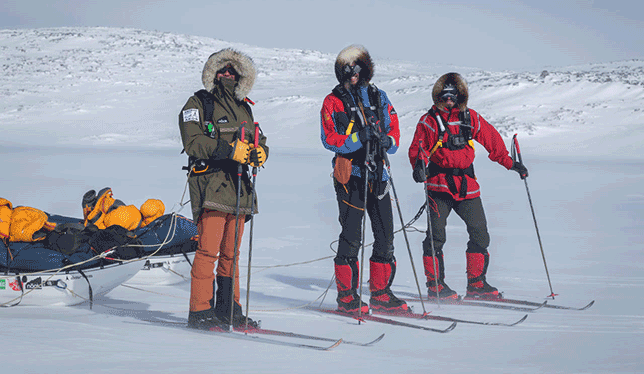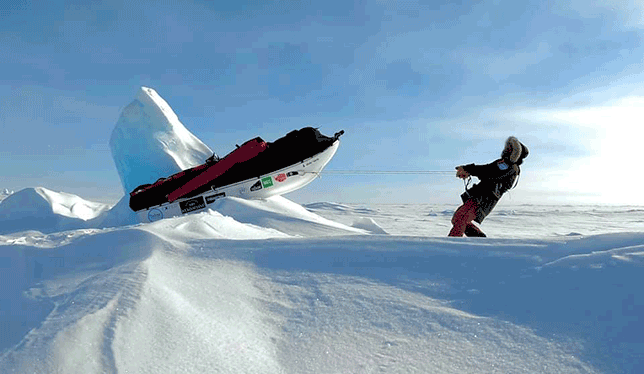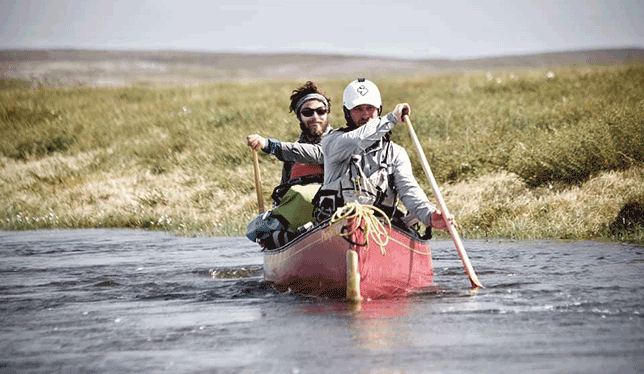It may seem crazy, but a group of Quebecers recently trekked across the country, starting in the Far North and ending in the southernmost tip seven months later. As if this wasn’t challenging enough, they also decided to participate in three research projects during their voyage.
In March 2021, the Expédition AKOR set off close to Nunavut’s northernmost tip. The adventurers then walked, skied, paddled and cycled to the southernmost point in Ontario, a journey of over 7,600 kilometres. Opportunities to resupply were few and far between, rest was scarce, and entertainment was left to the participants’ imagination.
In November, the adventurers finally reached their destination on the U.S. border. The obvious question was, had they had enough by the end?

“It’s a really special feeling to be completely autonomous, thousands of kilometres from the nearest urban centre. It was a journey of overcoming,” Guillaume Moreau, a postdoctoral fellow in forestry at Université Laval, explained a few days before the end of the expedition. “So the short answer is yes, we had fun, but that wasn’t what kept us going. Travelling such huge distances, sharing our journey with people remotely, contributing to science, it’s all extremely rewarding,” he added, noting that many days were very difficult due to fatigue and injuries. So “pleasure” was far from the driving factor!
Advancing research
Nevertheless, advancing scientific research is a worthy motivator. The opportunity to apply the outcomes of theoretical work in the field was certainly appealing. The group thus set out armed with three agreements to collaborate in university-led scientific research projects.
As mentioned above, Dr. Moreau’s focus is forestry. In 2019, he joined the very first AKOR expedition in Nunavik at the start of his PhD. He took advantage of the trip to collect wood samples in order to study how trees behave over time.

The 2021 expedition offered similar opportunities. Tree cores were collected to measure the impact of climate change on forests in a variety of climate zones across the country. “The growth ring yields a lot of information,” confirmed Dr. Moreau, who estimated that harvesting these samples during the expedition cost a fraction of what it would have if a helicopter had been deployed for that purpose.
The second research project, led in collaboration with the kinesiology departments at Université Laval and the Université du Québec à Rimouski, focused on observing energy expenditure to understand how the human body adapts to extreme environments. “Living in -35 degree [Celsius] weather for months, dragging a 300-pound sled 10 hours a day… Let’s just say we were the perfect research subjects!” Dr. Moreau chuckled. “It’s a slow-moving field. You can’t just ask someone to subject themselves to such a life. It takes volunteers, like us,” he added, explaining that they had a set and very caloric diet. “One member lost 18 pounds in the first month of the expedition despite consuming 7,000 calories a day!” he noted with amusement.
Remote participants
The third research project is also the most unexpected. With the help of Nathalie Clément at the Université de Sherbrooke, nearly a dozen people living with severe chronic pain travelled the expedition’s 7,600 kilometres at their own pace and in their own way. “Constant communication with the [adventurers] certainly increased participants’ motivation,” explained Dr. Clément, who also suffers from chronic pain. “We wanted to measure the impact of this exchange with the patients, see how much it helped people move and improve their quality of life.”

This was made possible by the length of the expedition. “Seven months was long enough for participants to really feel the positive effects of physical activity on their bodies. There are shorter projects of a similar nature, but they don’t have the same impact,” she enthused. “They tell us: “Now, I can do X thing.” They’ve gained a confidence they didn’t have before.”
“We loved this aspect of the expedition because lots of people underestimate the power of motivation. It motivated us too,” added Dr. Moreau, a few seconds before hanging up and returning to his cold and solitary minimalist shelter.